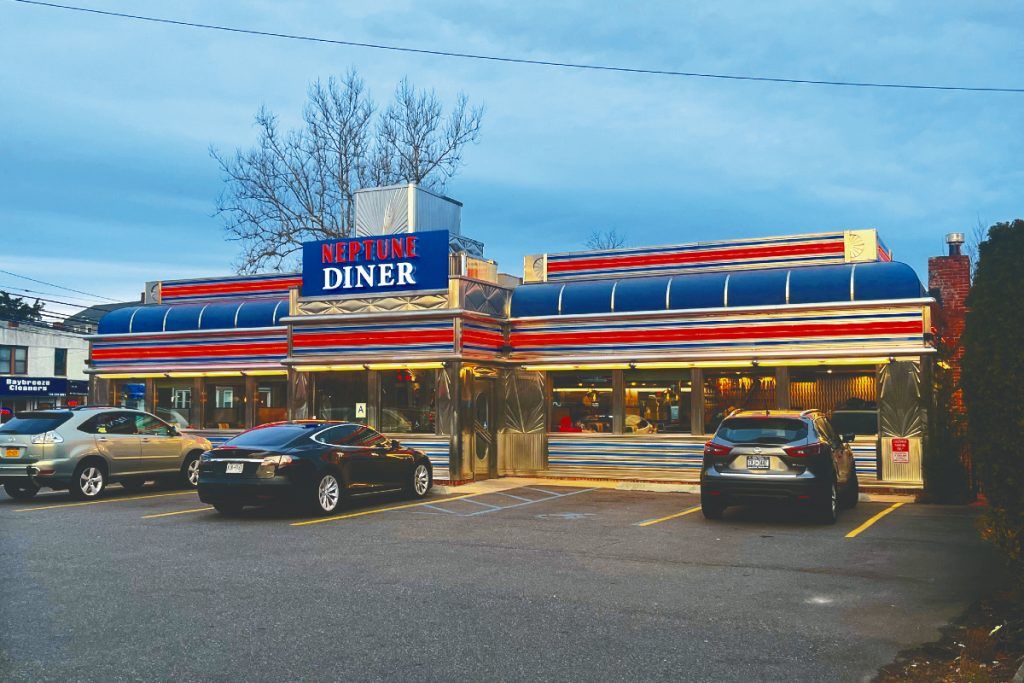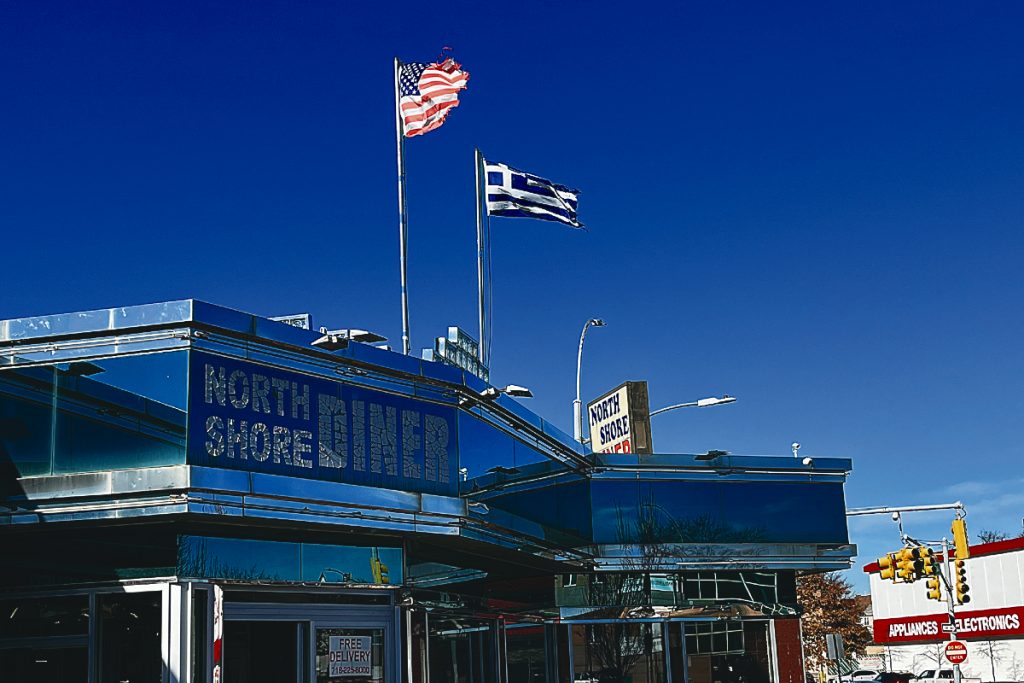Midnight was half an hour ago. It doesn’t matter to Alexander Kitroeff that it’s late. He’s come to Tom’s Diner in Manhattan to talk to its Greek owners, and for that, the later it is the better. The restaurant belongs to the Zoulis family from Kasos and everyone in the area knows it from the beloved TV series “Seinfeld”. It’s so popular, it’s best to choose a time when things are less full-on if you want a quiet chat with the owners. The historian and professor emeritus is sitting at the counter. Preparing to interview the two men from Kassos for his new book, he pulls out his notepad.
Just then, someone bangs on the restaurant window. A tall, homeless black man, one of those skinny guys who wears two coats to keep out the cold, is standing outside the shop. To the man’s surprise (he’s probably wondering “What’s this? Another episode of Seinfeld?”), one of the owners opens the door for him, brings the man in, sits him down at a table and serves him soup, patting him amicably on the back.
“The next morning, at the Columbia University alumni meeting next door, the diner’s Greek owner greets almost everyone, patting them on the back in the same friendly way. I asked him how he knew them all and he smiled a broad, warm smile, like it was the most natural thing in the world…”. Mr. Kitroeff is recounting his New York experiences in a “Greek” café in Pangrati, Athens, analyzing the results of his research into the Greeks and their restaurants in America for me. “And you know, this café might just be a little less… Greek than its American counterparts, which have kept that special warmth and hospitality—that specifically “Greek” feel—you can no longer find in the home country…”
As he reaches this conclusion, the professor emeritus in History at Haverford, Philadelphia, smiles. “I’m not sure the hospitality gene is engraved on our DNA like we think it is,” he says. “We’re told the ancient Greeks were hospitable, that the New Testament talks about our hospitality, and Kazantzakis writes about it, too, so we believe that’s how we should be.” “Something like our brand?” I comment, expecting a reaction, but he replies as calmly as can be: “Yes, you could say that…”.
Jews, Irish, Greeks
The words “Greeks” and “diners” first became synonymous in the second half of the 20th century, the historian explains. That was when Greeks started buying the restaurants from their Jewish or Irish owners, who had made their pile and no longer had the appetite for the hard work these restaurants demand. Many of them used to stay open 24 hours a day. It was a job that didn’t require a knowledge of English beyond the menu, and all the main tasks could be done by family members: dad in the kitchen, mom at the till, the kids waiting tables.
So, from the 1950s on, when Greek immigrants began to arrive in the US again, their name and reputation became associated with the most typically American restaurant of them all: the diner. The diner was created to meet the needs of the thousands of workers employed in America’s factories and businesses in the thriving economy of the early 20th century. Later on, as Mr. Kitroeff explains, diners became an institution, something like the neighborhood tavernas in Greece. They provided quick service and offered a wide variety of dishes with an emphasis on the classic American breakfast of eggs, bacon, sausages and pancakes. The interiors were functional and reminiscent of a railway carriage, with a long counter with stools in front of the kitchen for customers who were alone, and fixed seating behind it where groups of customers sat facing each other at tables by the window.
The “dish washers” who climbed the social ladder
Mr. Kitroeff recalls that the idea for his research came from a US senator who spontaneously responded to a question of his with the phrase: “I don’t know anything about Greece, except for the restaurant of one of my Greek constituents, where I often go to eat…”. As he says, when they first arrived in America, the Greeks started out as dishwashers in restaurant kitchens, but worked their way up, in time becoming owners or chefs. Now, of course, they run blisteringly expensive restaurants serving Greek specialties in Manhattan. This all-powerful connection between Greek-Americans and food gave rise to jokes like “What does a Greek do when he meets another Greek in America? Why, they open a restaurant!”
However, Greek involvement with restaurants in the United States has always come in multiple forms and has changed a great deal over time. Initially, the first immigrants opened small restaurants or canteens to serve their compatriots. But they quickly expanded into preparing basic American cuisine, attracting immigrants from other countries and American customers.
Working and saving
And how did they live? They worked and they saved. The Kasiot family who own Tom’s Diner work all day long. When the young people call it a day at the diner, they go to the Kasos Club, which Mr. Kitroeff tells us is way up on 230th Street in New York. There, they play cards like people possessed, thinking about the day they’ll return to their island for good to farm their fields. “They explained that these kids had nothing,” he says. “Just home, work a 12-hour shift, then cards at the club. They don’t go out and they don’t participate in the city’s social or cultural life. Of course, not everyone is like that.”
But how come an expert on national identity ended up working on diners? “I like social history and I’m tired of elites,” he answers naturally. Having produced a series of studies on the Greeks in Egypt, the Orthodox Church and the creation of the American Hellenic Educational Progressive Association, he decided to go back to the nation’s “roots”.
The Twin Towers diner
“Whose story made the greatest impression on you?” I ask. He doesn’t need to think: “Chris Panagiotou’s,” he says straight off. He explains that Chris Panagiotou’s father and his partner ran a diner very close to the Twin Towers. When the Towers came down, on top of the other tragic consequences of the terrorist attack of September 11, 2001, the dense dust clouds polluted the air so heavily that the residents were told it would be best to stay away until the dust settled and could be removed. But, seeing as they’d just opened their restaurant, the two men went to work every day. And their lungs were so severely compromised, they both contracted pneumonia when the COVID pandemic hit and died. Chris Panagiotou was devastated and closed the restaurant. But, as Mr. Kitroeff explains, the Black Lives Matter and MeToo movements hit the streets right after. Friends told him he should go and secure the entrance to the restaurant, as there were demonstrations in the area every day and the restaurant’s frontage could end up getting damaged.
“When he arrived outside his locked-up restaurant, which he hadn’t been to for some time, Chris Panagiotou found the doorway full of notes, dedications and bouquets of flowers left in his father’s memory. They all said what a wonderful man he’d been, how much he’d helped people in the area… the doorway had been turned into a shrine… They’d even written his father’s name in red letters on the circular pavement slab outside the restaurant.” After that, how could he not reopen the restaurant? And he’s doing business still.
So what image do Americans have of the Greeks today?
“A very, very positive one. We have an extremely good reputation as a nation. Of course, there was discrimination in the past, but that all stopped in the second half of the 20th century, and we enjoy an excellent reputation now. People know we’ve done well for ourselves!”.
So what’s the recipe for getting ahead in the States?
“In the Greeks’ case, integrate and work really hard. In Egypt, for example, where the Greeks stood out from the citizens of Britain, France and Italy, who knew they had an empire behind them, no matter what, they had to learn to stand on their own two feet, to get along with the locals, and to work hard. In the US, too, being an immigrant meant working hard, going without anything but the essentials, and putting as much money aside as humanly possible. The first generations sacrificed themselves for the generations that followed.”
Thus, for many Greek-American families, owning a diner was their first step toward turning their American Dream into a reality. Just as the restaurant served as a ‘stepping stone’ up the social ladder for their Greek owners, so, for the immigrants who arrived in the post-war period, the diner became the cornerstone of their children’s social ascent.
The children of these restaurant owners made good include former US Vice President Spiro T. Agnew, Senator Paul S. Sarbanes, former CIA chief George Tenet, Nixon’s Secretary of Commerce Peter Peterson, author George Pelecanos, and actress Jennifer Aniston.
And what conclusions has he drawn from his study?
“That Greeks go about things abroad in a way that doesn’t work in Greece. There are no corresponding rules or incentives in our country, where bureaucracy reigns supreme. Who starts out washing dishes in Greece and ends up opening their own restaurant a few years later? When I asked the Greeks in those restaurants how they did it, they answered “We worked hard, we placed our trust in our family and our religion, and this country provided us with opportunities—it’s the best country in the world”.
And today?
“Of course, a lot has changed. These families’ children have been to university. They’ve joined the ranks of the middle class, moved away, left the family business behind. There are so few Greek workers and leftists left, they’re virtually extinct…”.
And so the number of Greek-owned diners is gradually decreasing. What’s more, diners have had to deal with new competitors since the 1990s, with restaurant chains like Le Pain Quotidien and Taco Bell joining traditional competitors like McDonald’s and pizzerias. The rise in property values also makes it profitable for owners to sell. And it’s a double whammy, because anyone who runs their diner from a rented property has had to deal with rent increases, he explains. More importantly, the younger generation, who are in a position to go to university thanks to their parents’ hard work, prefer less labor-intensive professions. Still, even today, a lot of diners remain in Greek hands and the second-generation have set about modernizing the family businesses, changing the menu or upgrading the interior décor.
Clearly, though, Mr. Kitroeff notes, the Greeks’ success in this area is due to the warmth and hospitality they bring to a type of restaurant whose main purpose in life is rapid service. While the diner always needs to turn its tables over, the owners were raised in small towns or villages in the Greek provinces or islands and can’t stop being who they are. So they behave like taverna owners do back in Greece, welcoming their guests with a pleasantry and a friendly pat on the back.
On the big and small screens
Finally, another reason why Greeks will long continue to be associated with this kind of restaurant in the collective consciousness is the sheer number of Hollywood movies and TV series that feature scenes in diners. Some of these are Greek-owned, too: to name just two, there’s Hector’s Diner in Martin Scorsese’s Taxi Driver, which is owned by Danny (Dionysis) Manesis, and the Jackson Hole Diner belonging to Jimmy and Chris Mescouris where a scene from Goodfellas was shot. As for the Zoulis family diner, Suzanne Vega has written a song called “Tom’s Diner” dedicated to the restaurant. Saturday Night Live used to have sketches, too, set in a fictional diner called the Olympia Restaurant. It was based on a well-known restaurant in Chicago, which was owned by the Sianis family who emigrated to America from the mountains of Arcadia. The owner was played by the well-known American actor John Belushi.






